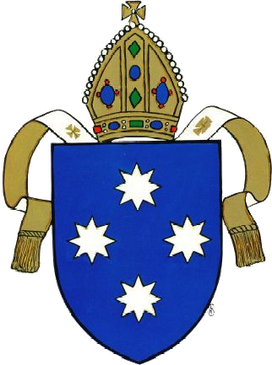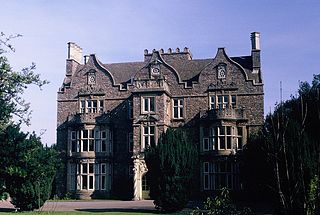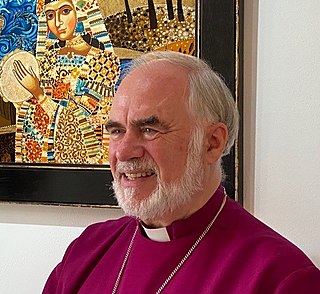Related Research Articles

Anglo-Catholicism comprises beliefs and practices that emphasize the Catholic heritage and identity of the Church of England and various churches within Anglicanism. Anglo-Catholicism claims to restore liturgical and devotional expressions of church life that reflect the ancient practices of the early and medieval Church.

Wycliffe Hall is a permanent private hall of the University of Oxford affiliated with the Church of England, specialising in philosophy, theology, and religion. It is named after the Bible translator and reformer John Wycliffe, who was master of Balliol College, Oxford in the 14th century.

The Diocese of Sydney is a diocese in Sydney, within the Province of New South Wales of the Anglican Church of Australia. The majority of the diocese is evangelical and low church in tradition.

Ridley Hall is a theological college located on the corner of Sidgwick Avenue and Ridley Hall Road in Cambridge, which trains men and women intending to take Holy Orders as deacon or priest of the Church of England, and members of the laity working with children and young people as lay pioneers and within a pastoral capacity such as lay chaplaincy.
Broad church is latitudinarian churchmanship in the Church of England in particular and Anglicanism in general, meaning that the church permits a broad range of opinion on various issues of Anglican doctrine.
In Anglican Christianity, the term low church refers to those who give little emphasis to ritual, often having an emphasis on preaching, individual salvation and personal conversion. The term is most often used in a liturgical sense, denoting a Protestant emphasis, whereas "high church" denotes an emphasis on ritual, often Anglo-Catholic.

Trinity College, Bristol is an evangelical Anglican theological college located in Stoke Bishop, Bristol, England. It offers a range of full-time and part-time taught undergraduate and postgraduate courses which are validated by the University of Durham through the Common Awards Scheme, though the college sets its own curriculum. Many of its students are training for ordination in the Church of England; and hence there is a strong vocational aspect to the courses it provides. It also has students of other Christian denominations, as well as students who are intending to serve within various forms of lay ministry. The college also has a significant number of students studying for research degrees at masters and doctoral levels. All of Trinity's postgraduate research courses are validated by the University of Aberdeen.
The Cambridge Theological Federation (CTF) is an association of theological colleges, courses and houses based in Cambridge, England and founded in 1972. The federation offers several joint theological programmes of study open to students in member institutions; these programmes are either validated by or are taught on behalf either the University of Cambridge or Anglia Ruskin University. It also offers courses as part of the Common Award validated by Durham University.
Churchmanship is a way of talking about and labelling different tendencies, parties, or schools of thought within the Church of England and the sister churches of the Anglican Communion. The term has been used in Lutheranism in a similar fashion.

Ripon College Cuddesdon (RCC) is a Church of England theological college in Cuddesdon, a village 5.5 miles (8.9 km) outside Oxford, England. The College trains men and women for ministry in the Church of England: stipendiary, non-stipendiary, local ordained and lay ministry, through a wide range of flexible full-time and part-time programmes.
Ronald Ralph Williams was a Church of England bishop. He was Principal of St John's College, Durham from 1945 to 1953 and Bishop of Leicester from 1953 to 1979.
Fulcrum is a think tank based around the evangelical centre-ground of the Church of England. Formed in 2002, Fulcrum aims to renew the moderate centre of the evangelical tradition in the Church of England. Fulcrum is normally viewed as representative of the open evangelical tradition within the Church of England.
Conservative evangelicalism is a term used in the United Kingdom to describe a theological movement found within evangelical Protestantism. The term is used more often in this sense, but conservative evangelicals themselves tend to use it interchangeably and synonymously with evangelical. Conservative evangelicals are sometimes called fundamentalists, but they typically reject that label and are keen to maintain their distinct identity, which is more Reformed. Reformed fundamentalism shares many of the characteristics of conservative evangelicalism. In this sense, conservative evangelicalism can be thought of as distinct from liberal evangelicalism, open evangelicalism, and charismatic evangelicalism. Some conservative evangelical groups oppose the ordination of women as ministers or clergy and/or women holding leadership positions.

Martyn William Percy is a British academic, educator, social scientist and theologian. Ordained as a priest in the Church of England, in 2022 he announced that he was leaving the Church of England, though remains Episcopalian-Anglican. He had been Dean of Christ Church, Oxford, from 2014 to 2022 and principal of Ripon College Cuddesdon, Oxford, from 2004 to 2014.

Graham Kings is an English Church of England bishop, theologian and poet. In retirement in Cambridge, having served as Bishop of Sherborne and then Mission Theologian in the Anglican Communion, he is an Honorary Assistant Bishop in the Diocese of Ely and Research Associate at the Cambridge Centre for Christianity Worldwide, which he founded in 1996. His latest books are: Nourishing Connections , Nourishing Mission: Theological Settings , Exchange of Gifts: The Vision of Simon Barrington-Ward , edited with Ian Randall.
Central churchmanship describes those who adhere to a middle way in the Anglican Communion of the Christian religion and other Anglican church bodies, being neither Anglo-Catholic nor low church in their doctrinal views and liturgical preferences.
Modern Church is a charitable society promoting liberal Christian theology. It defends liberal positions on a wide range of issues including gender, sexuality, interfaith relations, religion and science, and biblical scholarship. In church affairs it supports the role of laity and women ministers. Members receive the journal Modern Believing and the newsletter Signs of the Times. A substantial account of its theology is Paul Badham’s The Contemporary Challenge of Modernist Theology. From 2011-2013 it published a series of short books introducing some of its themes. It has a large website. There is a regular annual conference. The theological principles behind its liberalism are that

Evangelical Anglicanism or Evangelical Episcopalianism is a tradition or church party within Anglicanism that shares affinity with broader evangelicalism. Evangelical Anglicans share with other evangelicals the attributes of "conversionism, activism, biblicism and crucicentrism" identified by historian David Bebbington as central to evangelical identity. The emergence of evangelical churchmanship can be traced back to the First Great Awakening in America and the Evangelical Revival in Britain in the 18th century. In the 20th century, prominent figures have included John Stott and J. I. Packer.
Anne Catherine Dyer is a British Anglican bishop, and previously an academic administrator.

The Cambridge Centre for Christianity Worldwide (CCCW) is a study, teaching and research centre in Cambridge, England and a member of the Cambridge Theological Federation which is affiliated with the University of Cambridge.
References
- 1 2 Kings, Graham (September 2003). "Canal, River and Rapids: Contemporary Evangelicalism in the Church of England". Anvil. 20 (3) – via Fulcrum Anglican.
- ↑ Percy, Martyn (1998). Power and the Church: Ecclesiology in an Age of Transition. Bloomsbury Academic. pp. 210–211. ISBN 9780304701056.
- ↑ Chapman, Mark (2006). Anglicanism: A Very Short Introduction. Oxford University Press. p. 72. ISBN 9780191578199.
- ↑ "The Ethos at Ridley". Archived from the original on 22 February 2018. Retrieved 9 October 2019.
- ↑ "Broad Church Movement". The Episcopal Church. Retrieved 2024-11-12.
- ↑ "Liberal Evangelicalism". The Episcopal Church. Retrieved 2024-11-12.